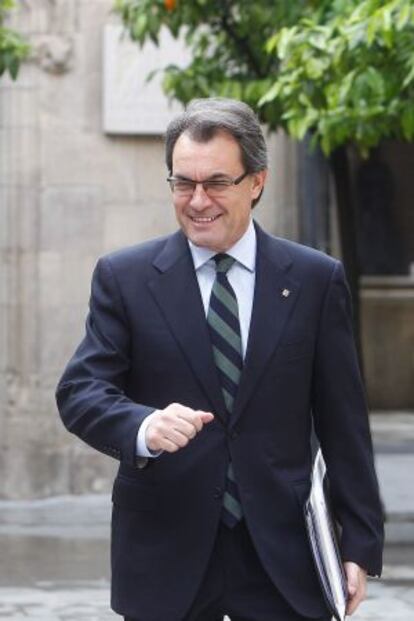Catalonia uses its diplomatic web to promote sovereignty cause
Diplocat corps describes Spain as a “chaotic” nation oppressing Catalan nationalist sentiment


The diplomatic machinery assembled by the pro-independence Catalan government to explain its sovereignty drive to the international community is already in motion. Diplocat, the name given to the network, has drawn up a fact sheet in order to help personnel get across to a wider audience the vision that premier Artur Mas has of Catalonia, and the state of its relations with Spain.
The list of talking points, to which EL PAÍS has had access, depicts Spain as a “chaotic” country, where the state and its agencies oppress the Catalan people’s nationalist feelings. Spain is accused of refusing to negotiate with a “peaceful movement” toward sovereignty, while at the same time strangling the region’s economy through an unfair system of public finance.
“Many Catalans no longer recognize Spain as the tolerant and inclusive country that they hoped would be built after Franco,” the introduction to the document reads. The argument moves on to defend Catalans’ “right to decide” amid an atmosphere in which few now believe in the possibility of a negotiated accord between Barcelona and Madrid.
Premier Mas led his center-right CiU nationalist bloc into elections last fall on a pro-sovereignty platform, promising to hold a referendum on independence for the region in the next four years. Talks between Mas and Spain’s conservative Prime Minister Mariano Rajoy have not yielded any breakthrough in a constitutional deadlock, with Catalonia needing help from the state to deal with a crippling deficit in its accounts. Madrid says any referendum would be constitutionally invalid.
Diplocat was launched by the Mas administration in February as an “amateur diplomatic corps” comprising volunteers who wish to help the Catalan government explain and foment the sovereignty process in an international context. Diplocat is funded publicly through the Catalan regional and provincial administrations and it is expected to use the 34 commercial missions and five political delegations that Catalonia already has around the world.
Catalan government sources have told EL PAÍS that the document has been circulated among those who wished to have it, with the region’s foreign delegations having already started to distribute its contents. The pro-sovereignty arguments contained in the fact sheet mirror the road map laid down earlier this year by CiU and its leftwing parliamentary partner ERC. The central idea is that Spain’s territorial model has failed and that it is Catalonia that is bearing the brunt of this situation.
“The flaws and inefficiencies within the system are being used by the Spanish government to justify recentralization, but in reality the decision to reverse the decentralization process was taken years ago,” the document says.
Diplocat argues that there is no difference between Rajoy’s Popular Party (PP) and the other main national groupings in terms of their attitude toward Catalonia. The text makes mention of PP Education Minister José Ignacio Wert’s stated desire to “Hispanicize” Catalan students, and concludes that Spain has decided that it does not wish to be a “multicultural society.”
“Many Spanish politicians, from both the left and the right, do not see the differences between Catalonia and the rest of Spain as a source of cultural wealth, but rather as a threat to national unity.” On this same point, the document states that these political parties have “appropriated” Spain’s Constitution in order to interpret it in line with their own interests.
“Some Catalan politicians still wish to continue to negotiate, in the hope of converting Spain into a federal state. But the Spanish government has already said that this is unacceptable and many Catalans believe that you cannot negotiate with Spain because Spain does not wish to do so,” the Diplocat argument runs.
The factsheet also describes the supposedly unfair treatment Catalonia receives in terms of public financing. “Each year Catalonia’s fiscal deficit is equivalent to 8.7 percent of its GDP,” the text asserts with regard to the difference between what the region contributes to national taxation coffers and what it receives in services provided by the state.
“Catalonia, one of the engines of the European economy, is deeply indebted and is struggling to pay for its basic public services,” Diplocat argues, adding a point on the issue of centralized spending decisions: “The lack of state investment in key infrastructure has weakened the Catalan economy.”
Tu suscripción se está usando en otro dispositivo
¿Quieres añadir otro usuario a tu suscripción?
Si continúas leyendo en este dispositivo, no se podrá leer en el otro.
FlechaTu suscripción se está usando en otro dispositivo y solo puedes acceder a EL PAÍS desde un dispositivo a la vez.
Si quieres compartir tu cuenta, cambia tu suscripción a la modalidad Premium, así podrás añadir otro usuario. Cada uno accederá con su propia cuenta de email, lo que os permitirá personalizar vuestra experiencia en EL PAÍS.
¿Tienes una suscripción de empresa? Accede aquí para contratar más cuentas.
En el caso de no saber quién está usando tu cuenta, te recomendamos cambiar tu contraseña aquí.
Si decides continuar compartiendo tu cuenta, este mensaje se mostrará en tu dispositivo y en el de la otra persona que está usando tu cuenta de forma indefinida, afectando a tu experiencia de lectura. Puedes consultar aquí los términos y condiciones de la suscripción digital.








































